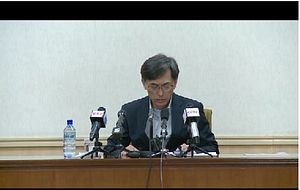KCNA is reporting that two South Korean spies, Kim Kuk-gi and Choe Chun-gil, have been “unmasked and arrested while committing espionage.” Video, posted alongside the text, shows two men, both apparently not of North Korean descent, reading from a prepared script.
The two men confess to operating as spies for the United States and the South Korean “Intelligence Service,” North Korea’s way of referring (in English) to the National Intelligence Service (NIS).
Both men, according to KCNA, “gathered information about the DPRK’s party, state and military secrets by leaving no means untried under the manipulation and with the backing of the U.S. and the IS and made desperate efforts to spread bourgeois lifestyle and culture in the DPRK.” The second man, Choe Chung-gil, is seen wearing handcuffs and appears more rattled than the first speaker, Kim Kuk-gi.
Kim, “who worked as an ambush spy in Dandong, China for over a decade,” recounts his propaganda efforts from an underground church. Most notably, he collected information about Kim Jong-il’s 2010 trip through Northeast China. He also built a spy network in Dandong and helped disseminate anti-DPRK information, including cartoon books. He claims to have been bribed by the NIS.
Dandong is the location of much cross-border interaction. It is a central contact point for businessmen, missionaries, and – one can assume – spies. It is here where an AWOL KPA solider was recently captured after taking a Chinese woman hostage. Journalists interested in cross-border trade and Sino-North Korea relations often choose this border-city as their place of investigation.
Choe, who also “committed espionage against the DPRK while residing in Dandong,” worked with a Chinese resident “to gather data on munitions factories… aircraft bunkers, airfields and new types of tanks [sic].” He also bribed others in North Korea and China to “[gather] information which could be used for false propaganda about ‘human rights’… in the DPRK.”
The “unmasking” took place at the People’s Palace of Culture, among “reporters at home and those of the General Association of Korean Residents in Japan and foreign correspondents.” Followers of the “re-defector” press conferences will recognize the venue and layout. It is here where several re-defectors spoke to an audience of domestic and foreign reporters about their experiences working in China and living in South Korea.
Like the re-defector press conferences, the “unmasked spies” conference is more show than substance. The actual truth-value is probably quite low. The narrative is tightly controlled propaganda, used for the purpose of pushing back against negative perceptions of North Korea. But to call it nothing more than propaganda is to miss the point of these types of press conferences.
These conferences are, as argued elsewhere, part of North Korea’s broader information management strategy, an effort to harness the power of discourse to shape people’s expectations of what life is like inside and outside North Korea – in this case, mainly outside. The unmasked spies press conference portrays Northeast China, specifically Dandong, as an area filled with conniving spies and distrustful Chinese. The message communicated is, no doubt, carefully constructed to frame Americans, South Koreans, human rights activists, and opportunistic Chinese as enemies of the state. Whether it succeeds in convincing people is an open question.

































